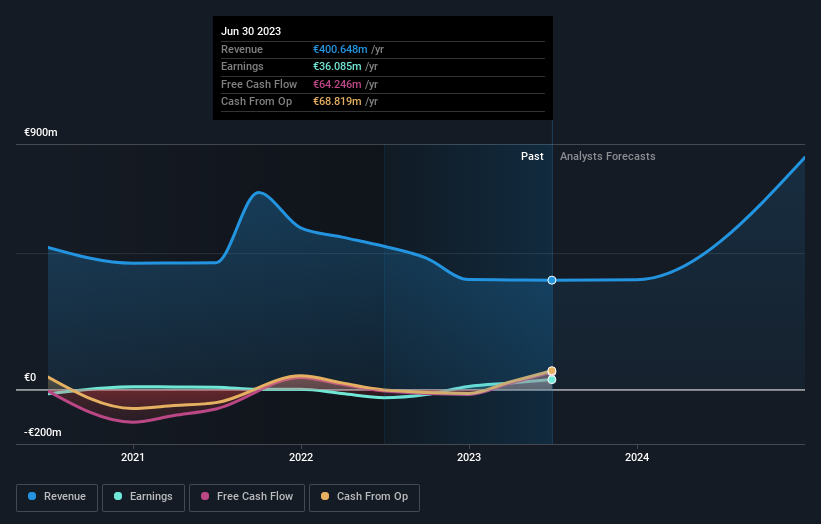Stock Analysis
- Greece
- /
- Construction
- /
- ATSE:AVAX
Following recent decline, Avax S.A.'s (ATH:AVAX) top shareholder Top Key Executive Christos Joannou sees holdings value drop by 10%

Key Insights
- Significant insider control over Avax implies vested interests in company growth
- A total of 3 investors have a majority stake in the company with 57% ownership
- Using data from company's past performance alongside ownership research, one can better assess the future performance of a company
Every investor in Avax S.A. (ATH:AVAX) should be aware of the most powerful shareholder groups. We can see that individual insiders own the lion's share in the company with 70% ownership. In other words, the group stands to gain the most (or lose the most) from their investment into the company.
As a result, insiders as a group endured the highest losses after market cap fell by €23m.
In the chart below, we zoom in on the different ownership groups of Avax.
View our latest analysis for Avax

What Does The Institutional Ownership Tell Us About Avax?
Many institutions measure their performance against an index that approximates the local market. So they usually pay more attention to companies that are included in major indices.
Institutions have a very small stake in Avax. That indicates that the company is on the radar of some funds, but it isn't particularly popular with professional investors at the moment. If the company is growing earnings, that may indicate that it is just beginning to catch the attention of these deep-pocketed investors. It is not uncommon to see a big share price rise if multiple institutional investors are trying to buy into a stock at the same time. So check out the historic earnings trajectory, below, but keep in mind it's the future that counts most.

Avax is not owned by hedge funds. Because actions speak louder than words, we consider it a good sign when insiders own a significant stake in a company. In Avax's case, its Top Key Executive, Christos Joannou, is the largest shareholder, holding 32% of shares outstanding. Konstantine Mitzalis is the second largest shareholder owning 17% of common stock, and Stelios Christodoulou holds about 8.3% of the company stock. Interestingly, the second-largest shareholder, Konstantine Mitzalis is also Chief Executive Officer, again, pointing towards strong insider ownership amongst the company's top shareholders.
To make our study more interesting, we found that the top 3 shareholders have a majority ownership in the company, meaning that they are powerful enough to influence the decisions of the company.
Researching institutional ownership is a good way to gauge and filter a stock's expected performance. The same can be achieved by studying analyst sentiments. While there is some analyst coverage, the company is probably not widely covered. So it could gain more attention, down the track.
Insider Ownership Of Avax
The definition of an insider can differ slightly between different countries, but members of the board of directors always count. Management ultimately answers to the board. However, it is not uncommon for managers to be executive board members, especially if they are a founder or the CEO.
Insider ownership is positive when it signals leadership are thinking like the true owners of the company. However, high insider ownership can also give immense power to a small group within the company. This can be negative in some circumstances.
It seems that insiders own more than half the Avax S.A. stock. This gives them a lot of power. That means they own €140m worth of shares in the €201m company. That's quite meaningful. Most would argue this is a positive, showing strong alignment with shareholders. You can click here to see if those insiders have been buying or selling.
General Public Ownership
The general public-- including retail investors -- own 27% stake in the company, and hence can't easily be ignored. While this size of ownership may not be enough to sway a policy decision in their favour, they can still make a collective impact on company policies.
Next Steps:
While it is well worth considering the different groups that own a company, there are other factors that are even more important. Consider for instance, the ever-present spectre of investment risk. We've identified 5 warning signs with Avax , and understanding them should be part of your investment process.
If you are like me, you may want to think about whether this company will grow or shrink. Luckily, you can check this free report showing analyst forecasts for its future.
NB: Figures in this article are calculated using data from the last twelve months, which refer to the 12-month period ending on the last date of the month the financial statement is dated. This may not be consistent with full year annual report figures.
Valuation is complex, but we're helping make it simple.
Find out whether Avax is potentially over or undervalued by checking out our comprehensive analysis, which includes fair value estimates, risks and warnings, dividends, insider transactions and financial health.
View the Free AnalysisHave feedback on this article? Concerned about the content? Get in touch with us directly. Alternatively, email editorial-team (at) simplywallst.com.
This article by Simply Wall St is general in nature. We provide commentary based on historical data and analyst forecasts only using an unbiased methodology and our articles are not intended to be financial advice. It does not constitute a recommendation to buy or sell any stock, and does not take account of your objectives, or your financial situation. We aim to bring you long-term focused analysis driven by fundamental data. Note that our analysis may not factor in the latest price-sensitive company announcements or qualitative material. Simply Wall St has no position in any stocks mentioned.
About ATSE:AVAX
Avax
Avax S.A. operates as a construction company in Greece and internationally.
Mediocre balance sheet and slightly overvalued.

